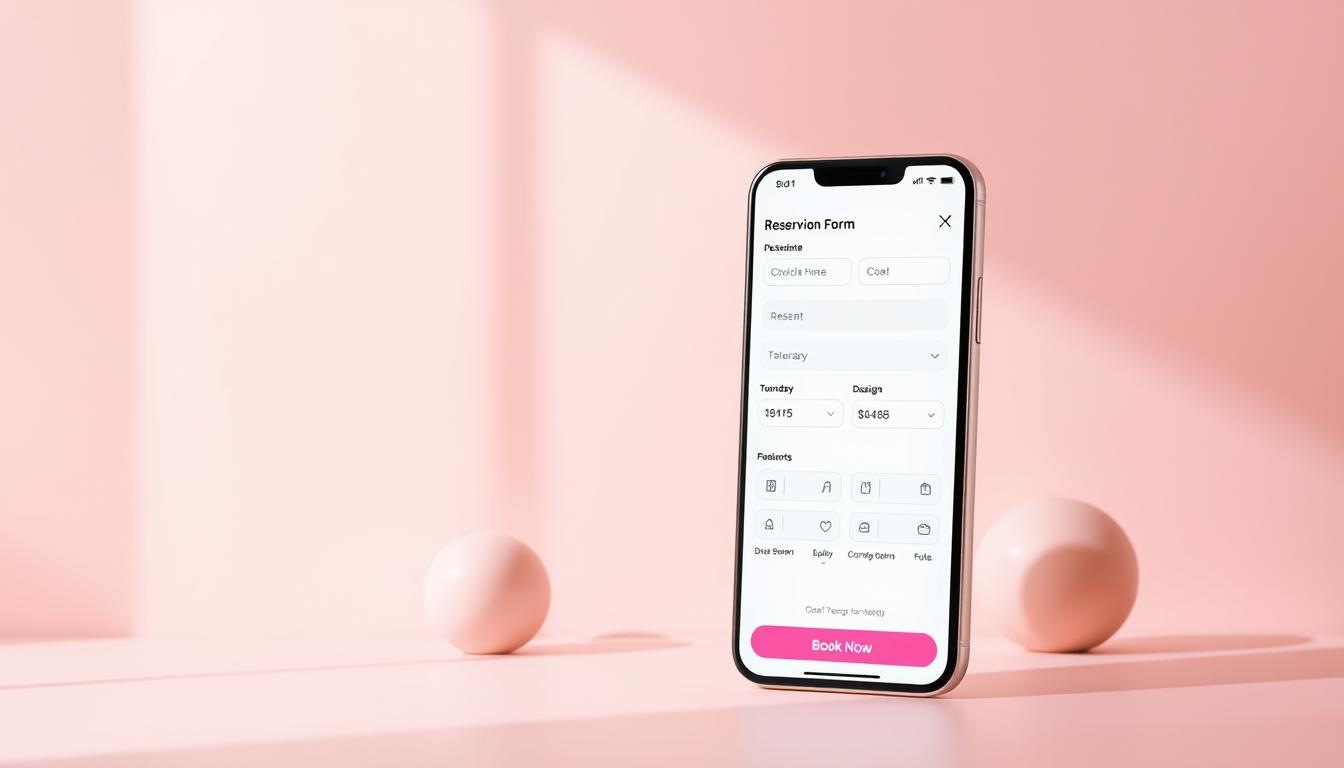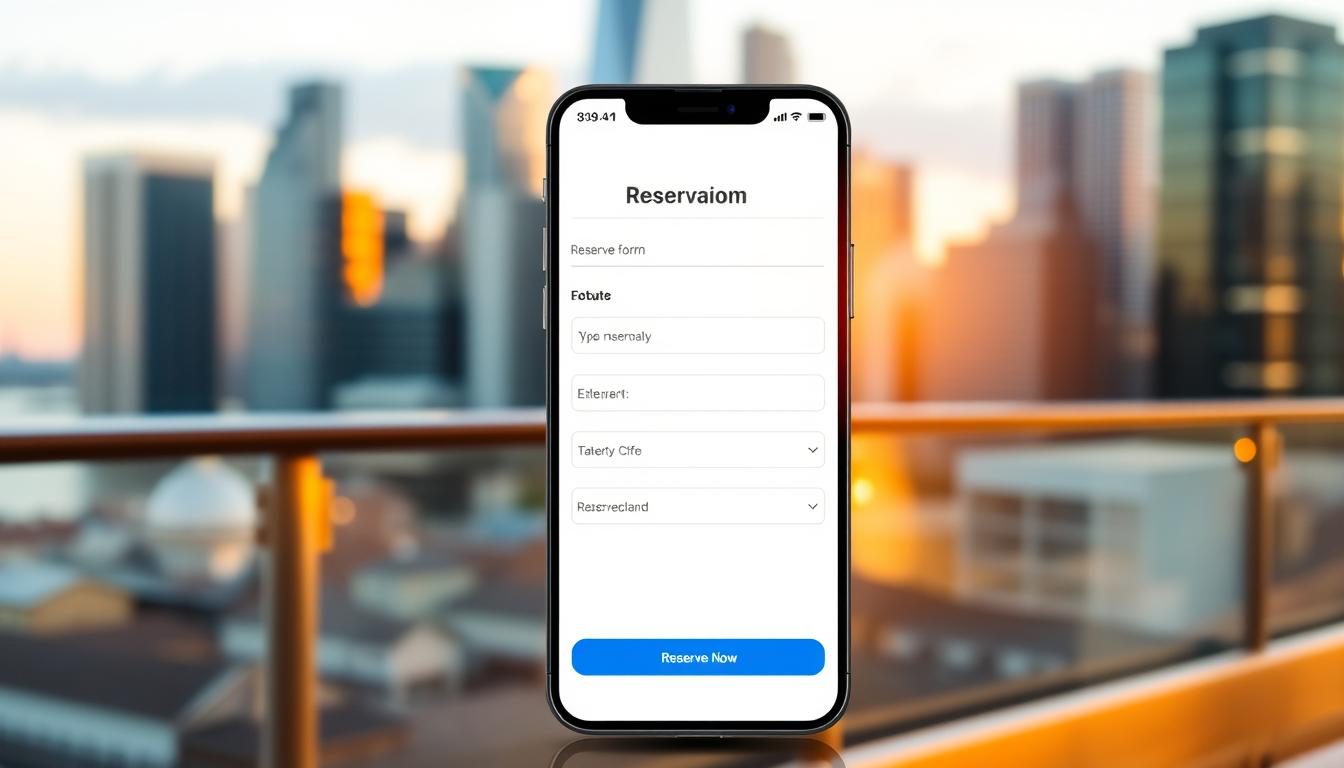In today’s world, a huge 70% of users leave their booking because of bad design.
This shows how key a user-friendly reservation form is in mobile apps. Good design makes users happy, helps more people book, and makes customers happy.

At Microdeft, we make designs that are easy and fun to use. If you need help with your app’s reservation form, we’re here to help.
Key Takeaways
- Understand the importance of UI/UX in reservation forms for mobile apps.
- Learn best practices for designing user-friendly reservation interfaces.
- Discover inspiration for modern reservation form designs.
- Explore how a well-designed form can improve conversion rates.
- Find out how to enhance customer satisfaction with intuitive UI/UX.
The Critical Role of Reservation Forms in Mobile Apps
A good reservation form is key for mobile apps. It connects users with service providers. Its design greatly affects how users feel, making it very important for businesses.
Why Reservation Forms Make or Break User Experience
Forms that are hard to use can make users upset. They might not book anything. But, a mobile-friendly reservation form that’s easy and nice to look at makes users happy.
The Business Impact of Well-Designed Forms
A good reservation form helps businesses a lot. This includes:
Conversion Rate Improvements
It makes users more likely to book. This means more bookings for businesses.
Customer Satisfaction Metrics
A visually appealing reservation form makes users happy. This makes them come back. For help making great reservation forms, talk to experts like Microdeft.

Understanding Modern UI/UX Principles for Reservation Forms
Making an interactive reservation form that grabs users’ attention is key. It’s not just about looks. It’s about making an easy-to-navigate reservation form that makes things simple for users.
Good reservation forms follow some important rules. Let’s dive into these rules.
Minimalism and Visual Hierarchy in Form Design
Minimalism means keeping things simple and clear. For reservation forms, it means cutting out extra fields. This makes the design clean and easy to use.
A good visual hierarchy helps users move through the form smoothly. It makes filling out the form easier.
Responsive Design Considerations for Various Devices
A responsive design makes sure your form works well on all devices. This is very important today. People might book on phones, tablets, or computers.
| Device | Screen Size | Design Consideration |
| Smartphone | Small | Simplify form fields, use large touch targets |
| Tablet | Medium | Balance form fields with available screen space |
| Desktop | Large | Utilize screen real estate to present more form options |
Accessibility Standards for Inclusive Mobile Forms
Accessibility means making your form work for everyone. This includes people with disabilities. It means following rules like clear labels and good color contrast.
For help making your form user-friendly and accessible, think about contacting Microdeft.
Essential Elements of Reservation Form Modern UI UX Design for an App
To make a good reservation form for mobile apps, focus on modern UI/UX. A good form is not just pretty. It’s about making the user’s journey easy.
Input Field Best Practices for Mobile Users
Input fields are key in any reservation form. For a sleek reservation form, make input fields easy to use. Use the right size, clear labels, and check for errors right away.
Date and Time Selection Components That Delight
Picking dates and times is important. Use easy-to-use date and time pickers. Visual calendars and time sliders help users pick what they want.
Progress Indicators and Multi-Step Form Flow
For long forms, show progress to help users. Break the form into steps and show how far they’ve come. This makes the form less scary.
Visual Feedback Mechanisms
Give users feedback right away for a better experience. Highlight choices, show confirmation messages, and use animations. Good feedback makes the form feel alive.
By adding these key elements, you can make a streamlined reservation form. It looks good and works well. For help, talk to experts like Microdeft.
Step-by-Step Guide to Creating User-Friendly Reservation Forms
Making a reservation form easy to use is key. A good form helps get user info fast and makes booking smooth.
Planning Your Form Structure and Information Architecture
First, plan your form well. Know what fields you need and put them in order. Make sure the form is easy to follow. Simplify your form by only asking for what’s really needed. Use simple labels for each field.
Designing for Touch Interactions and Thumb Zones
Mobile design needs to think about touch and thumb zones. Make sure your form is large enough for easy tapping. Place important parts where thumbs can reach them easily. This makes using your app better and cuts down on mistakes.
Implementing Smart Validation and Error Handling
Good validation and error handling are key for a great form. Use real-time validation to check input as users type. This gives them quick feedback on any mistakes.
Real-Time Validation Techniques
Real-time checks include verifying email, phone, and dates as users type. You can use JavaScript or HTML5 for this. For example, HTML5’s pattern attribute can check input formats.
| Validation Type | Description | Example |
| Email Validation | Checks if the input is a valid email address | user@example.com |
| Phone Number Validation | Verifies if the input is a valid phone number | (123) 456-7890 |
| Date Validation | Ensures the input date is valid and within a specified range | 2023-07-25 |
By following these steps and using smart validation, you can make a reservation form that’s easy to use. For help with designing forms, contact Microdeft.
Mobile-Specific Design Considerations
Mobile app designers need to focus on mobile design. They must understand how mobile devices work and how they affect users.
Optimizing for Different Screen Sizes and Orientations
A good reservation form works on all screens and orientations. It uses responsive design to look good on any device. For example, flexible grids and images help fit different screens.
Keyboard and Input Method Optimization Strategies
It’s important to make input easy on mobile. Designers should pick input types that match the right keyboard. This makes filling out the form easier and less frustrating.
Leveraging Native Mobile Features for Better UX
Using what the phone can do makes the app better. Features like GPS, camera, and calendar make the form more fun and easy to use.
Using Device Capabilities (Camera, GPS, etc.)
For example, GPS can fill in location info. The camera can scan details. This makes the reservation process faster and better.
For help making a mobile-friendly reservation form, talk to experts like Microdeft. They know a lot about mobile app design.
Testing and Optimizing Your Reservation Form
To make a visually appealing reservation form, you need to test and improve it a lot. A good form makes users happy and helps more people book.
User Testing Methodologies for Mobile Forms
User testing is key to find and fix problems. For mobile forms, it’s important to test how they work in real life.
- Do A/B testing to see which design works best.
- Use remote usability testing to hear from many users.
- Do heuristic evaluation to spot usability problems.
A/B Testing Critical Form Elements
A/B testing compares two versions of a form part to see which one is better. You can test things like:
- Button colors and text
- How fields are laid out
- How error messages are shown
By looking at the results, you can make your form better based on data.
Performance Optimization for Faster Load Times
A slow form can scare users away. To make your form load faster:
- Reduce HTTP requests
- Make images smaller and files lighter
- Use browser caching
Analytics Implementation for Continuous Improvement
Analytics tools help you see how users act and find ways to get better. Watch these important numbers:
- How many people leave without finishing
- How many people actually book
- Where people stop using the form
By always checking these numbers, you can make your form better. This makes users happier and more likely to book.
For help making your reservation form better, talk to Microdeft. They know how to make a form that looks good and works well.
Inspiration Gallery: Standout Reservation Form Designs
Let’s look at some top reservation form designs. A sleek reservation form is more than looks. It makes using your app easy and gets users to act.
Hotel and Travel Booking Interface Examples
Hotel and travel apps know how to make booking easy. They use simple designs, clear actions, and easy-to-use navigation.
Restaurant Reservation UI Innovations
Restaurant apps now let you pick tables and add special requests. These features make booking better and more likely to succeed.
Event and Appointment Scheduling Interface Showcases
Apps for events and appointments have great forms. They include calendar links and show when you can book.
Analyzing What Makes These Designs Effective
So, why do these designs work so well? They mix being formal with being easy to use. They use clear labels, smart defaults, and few distractions for a smooth user experience.
| Design Element | Description | Benefit |
| Minimalistic Design | Clean and simple layout | Reduces user confusion |
| Clear Call-to-Actions | Prominent buttons and links | Guides user through the process |
| Smart Defaults | Pre-filled information based on user data | Saves user time and effort |
For help making great reservation forms, talk to Microdeft. By studying these designs, you can make a sleek reservation form. This will make your app better and help more users.
Conclusion: Elevating Your App with Professional Reservation Form Design
Creating a modern UI/UX reservation form is key for any app that needs booking. By following the tips in this article, you can make a form that looks good and works well.
A good reservation form can make users happy, leading to more bookings and happy customers. Make your form easy to use to help people book quickly.
For help making a top-notch reservation form, team up with experts like Microdeft. They know how to make your form work best, helping your app grow.


